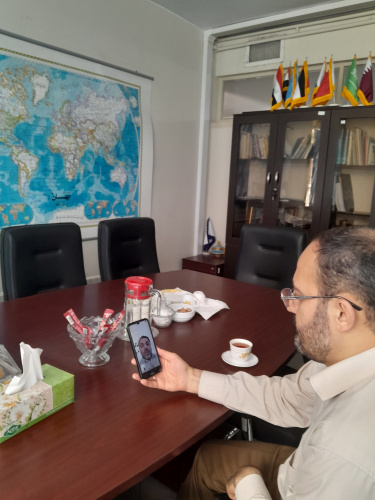Joint Meeting of the Office of Scientific and International Cooperation of the University with Iran’s Science Attaché in Russia
In line with the development of international scientific cooperation at the University of Applied Science and Technology, a virtual meeting was held on Saturday, May 24, 2025 (1404/3/3 in the Iranian calendar), attended by Dr. Bagheri Farahani, Head of the Office of Scientific and International Cooperation of the university, and Dr. Goudarzi, Iran’s Science Attaché in Russia.
In this meeting, Dr. Bagheri Farahani introduced the university’s capacities to enhance collaborations with Russia’s technical and vocational institutions, emphasizing Russia as a priority country alongside Germany, China, and India for developing partnerships. He noted that many of Russia’s existing capacities remain largely unknown to Iranians. He also stressed that the mutual membership of Iran and Russia in regional and international organizations such as BRICS and the Shanghai Cooperation Organization, as well as the unique current global circumstances, have further paved the way for bilateral cooperation. Among various fields of collaboration, he highlighted professional qualification as a key priority for the university’s international development, which has gained significant attention in recent years.
Dr. Goudarzi, for his part, underscored the importance of scientific relations between Iranian and Russian universities and noted Russia’s vast capacities for defining collaborative fields. He suggested that Russia should be the top priority for Iranian universities' international engagement. He also emphasized the necessity of introducing the educational programs and structure of the University of Applied Science and Technology to Russian institutions to foster cooperation.
Highlighting that academic and scientific capacities of Iran have become better known to Russian counterparts in recent years, Dr. Goudarzi noted the keen interest of Russian universities in expanding academic relations with Iran. He explained that Russia’s educational system is quite similar to Iran’s and predominantly public, with colleges dedicated specifically to vocational training. He introduced Russia’s “Specialty” degree — a program approximately equivalent to a master’s level, combining four years of university education with one year of specialized industrial training — as a noteworthy model linking vocational education and industry.
He further mentioned that some large companies in Russia recently started establishing private universities. This presents opportunities for expanding commercial and academic cooperation between Iran’s private sector and major Russian companies that have affiliated universities and colleges.
The meeting concluded with agreements on how to follow up and advance cooperation with Russian universities.

